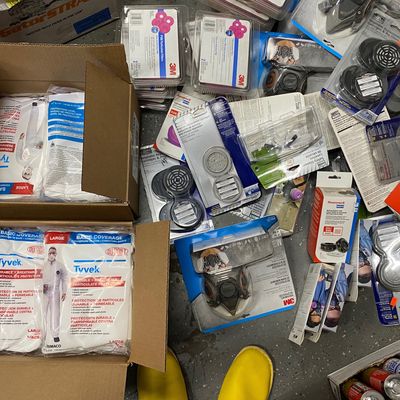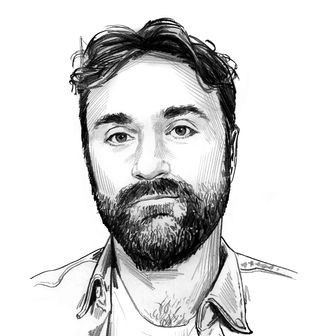
Matthew Maddy and Nico Arze have spent the last decade involved in the design, construction, and running of restaurants. The pair are co-founders of design and construction firm American Construction League, while Maddy is a partner in places including No. 7 and Arze in Birdy’s. (They’re both partners in the Brooklyn restaurant Celestine.) After the industry shutdown put their business on hold, they have found themselves using their connections and relations in the industry to collect much-needed personal protective gear from restaurants, hardware stores, and other businesses. Arze and Maddy spoke to Grub Street about the work they’re now doing.
Nico Arze: We started getting emails from friends of doctors and individual doctors in ICUs and EMTs who were asking for gloves and masks. I think the idea came to mind when an email from the wife of a doctor somehow arrived in our inbox. This was Wednesday, March 18. We put two and two together and realized that because of health department regulations, all restaurants and bars have a bunch of gloves.
The first thing we did was call our community of bars and restaurants and offer to go pick up these gloves and masks if they had them. On Thursday and Friday, we made phone calls. On Saturday and Sunday, we made pickups and started posting online. I think that on the first day, we collected about 50,000 pairs of gloves.
As soon as we got the first batch of gloves, we sent them to three or four different hospitals. Mostly it’s been gloves from bars and restaurants, but we’ve also delivered N95 masks we gathered from a closed hardware store and a few tattoo parlors. The possibilities are almost endless. There are thousands of hardware stores. Some have respirators and other inventory that was not sold. They’re all shut down. We’re reaching out to veterinarians, to dentists, to tattoo parlors.
Since that first weekend, I would say that we’ve donated 230,000 gloves, maybe 3,000 masks, both surgical and N95. We’ve also been getting hazmat suits, and we’re getting a load of face shields right now, coming from California, and others coming from New York manufacturers. We have donated to, I would say, 14 hospitals.
I think we’ve maxed out everyone we knew and everyone our friends knew. What has worked the best is friends’ calling people personally and asking for help. Every day we do outreach. I’m in charge of that, Matthew does deliveries and pickups. We also have people coming to us. On March 25, we had a guy in the Bronx delivering to hospitals and picking up masks. We’ve reached out to people who feel sick, donated gloves and masks to them so they can feel safe going through the hospital.
So we just need to keep pushing and pushing. Somebody just told me that they have 1,500 N95 masks they’re looking to donate. Suddenly it happens. We always need more, because everybody’s desperate. We’ve been talking to this importer who has been buying stuff from Taiwan and donating it to us. Today we got 3,600 face shields donated from Brooklyn manufacturers.
We’re collaborating with this very new organization, PPE_Needed_NYC on Instagram that’s helping us find out what hospitals need what. But I’m also getting text messages all the time from doctors and ICUs and EMTs being like, “Hey, we have run out, we need more, we need more, help, help.”
Matthew Maddy: There’s this whole improvised air traffic control from people who know hospital employees. The numbers get out. People get on these text threads. “There are 50 masks to pick up over here.” “There are 100 gloves to pick up over here.” “And they need this at Sloan Kettering, they need this at Presbyterian, Maimonides in Brooklyn is crashing and they need a bunch of this.”
Arze: This is a text message I just got: “Hello, I am an ICU nurse at Montefiore in the Bronx. Our unit is filled with critically ill COVID-19 patients and we are struggling with a limited amount of PPE. Let me know if you have any extra supplies to spare, specifically N95 masks. Thank you.” We get that all day.
Maddy: In response, I have about 3,000 pairs of gloves in my truck and about three gallons of hand sanitizer. But I don’t have any more N95 masks. The demand for the masks is always greater than what we’re able to provide. Masks and gowns are at a real premium. People aren’t saying, “We need 49 masks.” They’re saying, “We need masks.” So we’ll just take whatever we’ve got. I delivered a box of ten masks to an ER doctor out by Coney Island, she’s distributing them to her network of fellow ER doctors that all work within the NYU system.
Arze: It’s very distressing, and I understand there’s a shortage. That’s why I believe it’s important we scour for every single mask and glove in the state, because there’s just not enough. It’s not even just a matter of unwillingness from the government; it’s the fact that everybody is fighting for them. Matthew went to a hospital the other day and brought, I think, 6,000 gloves, a couple gallons of sanitizer. Outside the hospital, there was a tent — you’d go in and have to use hand sanitizer, and they had a box of gloves and a gallon, and they were both empty.
We have the bandwidth. We have the help. We have friends with cars and pickups. We have a system so people that are driving don’t get exposed. You’re in quarantine inside your car. When we get a donation, the donor just drops it in the back of the truck. We do that all day, then we disinfect the boxes, and then we drop them off to the people with full-protection gear. Generally, just the doctors pick it up from the back of the truck. We hope that this becomes a national thing — or, if we can, institutional help, that’s even better. But for now it’s just two guys, a few friends making phone calls, and a pickup truck doing this.
This is one thing we’re doing. Another is that in the restaurant industry, you see a lot of restaurant relief funds. I think that a lot of people are fundraising because there’s a pretty large undocumented community.
Maddy: A lot of restaurant owners we know are paying attention to who is successfully applying for unemployment, and then distributing money based on that. The first ten days or so, there were all these fire-sale things you could do, a little bit of takeout, you could sell off your wine and liquor collection. You take your perishable foods and build food baskets for employees so everybody doesn’t have to spend their money at the grocery store. But that’s all done.
Every week that this goes on, it’s just going to get more and more brutal. The whole plan to deal with this pandemic was to turn off the economy overnight, and it’s devastating. This conversation is often had through the rubric of public health, but there’s a huge public-health cost to immiserating the working class of a city, and nobody is talking about it. They’re talking about it like, “Oh, what a bummer; check out this local GoFundMe.” A very clear decision was made to immiserate a very needy, massive portion of the population with just zero plan for how to replace any of it.
Arze: It’s very important that there are grassroots organizations that are providing information and giving help that the government is not. Another project we’re doing is with the Mexican Coalition, a Bronx-based organization that works with undocumented immigrants, mostly in restaurants and the construction industry. We’re providing them with a list of our workers and other undocumented immigrants so we can make sure they get whatever benefits they can apply for.
It’s amazing how little information there is. Nobody knows. You have to really get on the phone and fight your way to it because the government has made the access to information explicitly very kind of medieval. So for instance, there are undocumented immigrants who can apply for unemployment if they fit certain parameters. What we’ve been doing is, we’ve been contacting labor lawyers, coalitions like the one we’ve been working with, and immigration lawyers. We’re gathering as much information as we can, and we’re starting to share it with restaurant owners and construction companies so they can share it with their workers.
Maddy: We happen to be right in the middle of the spiderweb for a lot of undocumented workers, because we work in both construction and restaurants. We’re all spending a lot of time — trying to coordinate the best, most relevant, up-to-date information on what benefits are available, what risks correspond with applying, given the militarization of ICE.
Arze: It’s all up in the air. A lot of our friends that are undocumented immigrants have gotten the coronavirus. From what we have seen, the experience they are having is completely different from that of people who are citizens or documented. Most of them live in Queens and the Bronx, and they’re going to hospitals and not even being accepted. So we’ve had to send a couple friends to Manhattan to get tested and treated, because in Queens it’s just impossible. That has created a whole new thing, which is, how do you transport them, because ambulances aren’t taking them? So we’ve had to turn our pickup trucks into improvised ambulances to carry our undocumented friends.
It is pretty dire. I have a friend who just got coronavirus, he has pneumonia too, and the hospital sent him back home without even testing him. Now his entire family has it: His mother, his grandfather, his uncles, his wife, because they all live very crammed together in the apartment. What are they going to do if they don’t have respirators? Just put them in the bed? They don’t have the cure. I know it’s not a bad intention, but the truth of it is that the reality seems very different between what’s happening in more-affluent places and poorer places.
More Shutdown Diaries
- We Bought the Diner From Twin Peaks. Then COVID Hit.
- I’m a Bartender Who Had COVID-19. My Restaurant’s Owner Warned Me Not to Talk.
- I Lost My Dad to Coronavirus. I Have to Reopen My Restaurant For Him.
